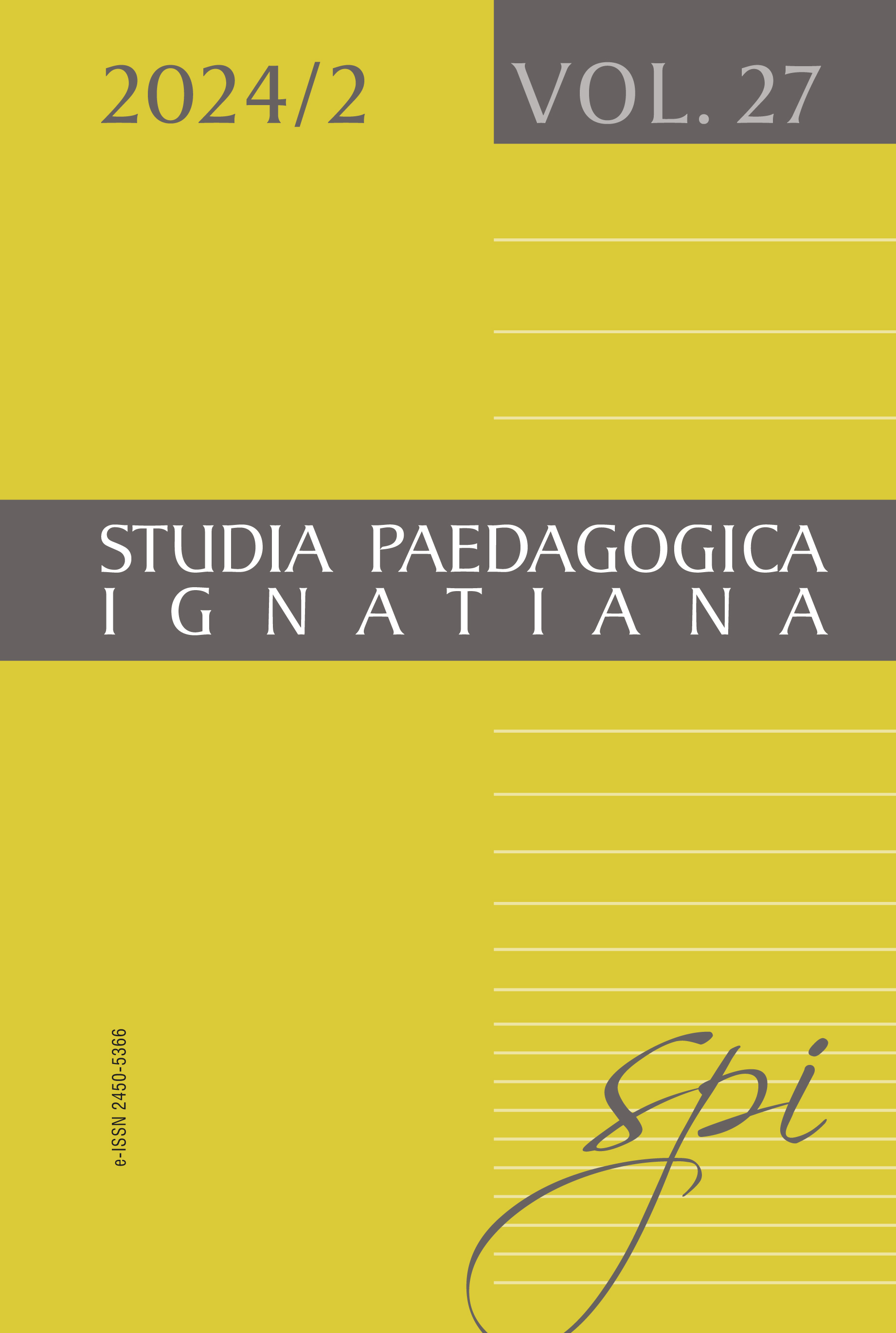Respecting Students’ Development Potential and Reflecting on Personal Experience: Stanisław Dunin-Borkowski’s Perspective on Being a Teacher and Educator (1864–1934)
DOI:
https://doi.org/10.12775/SPI.2024.2.002Keywords
pedeutology, teacher, education, Jesuits, educating leadersAbstract
In 2024, we commemorate the 160th anniversary of the birth and the 90th anniversary of the passing of Stanisław Dunin-Borkowski, a philosopher, Jesuit, teacher, educator, and author of widely read and respected works on education, particularly esteemed in German-speaking regions. Despite originating from a prestigious Polish noble family who lived near Lviv, Dunin-Borkowski’s contributions to pedagogical thought remain regrettably underappreciated in his homeland of Poland. This article endeavors to shed light on specific facets of Dunin-Borkowski’s pedeutology through an in-depth examination of his pedagogical autobiography. The focal points of analysis include his profound belief in the formative influence of teacher figures in shaping one’s identity as an educator. Moreover, the author delves into Dunin-Borkowski’s penchant for identifying and nurturing individuals with above-average potential, primed to assume leadership roles in society. The article also places significant emphasis on the author’s exploration of Dunin-Borkowski’s advocacy for recognizing and honoring the internal potential of students, a principle that continues to resonate in European pedagogical discourse from the late 19th to the early 20th century and beyond.
References
Dunin-Borkowski S. (1920). Reifendes Leben: ein Buch der Selbstzucht für die Jugend. Berlin: Dümmler.
Dunin-Borkowski S. (1922). Führende Jugend. Aufgaben und Gestalten junger Führer, Berlin: Dümmler.
Dunin-Borkowski S. (1923). Schöpferische Liebe. Ein Weg zur sittlichen Vollendung, Berlin: Dümmler.
Dunin-Borkowski S. (1926). Zur Methode der Jugenderinnerungen, [w:] E. Hahn (red.). Pädagogik in Selbstdarstellungen, Leipzig: Felix Meiner, s. 1–43.
Dunin-Borkowski S. (1929). Miniaturen erzieherischer Kunst, Berlin: Dümmler.
Dunin-Borkowski S. (1930). Ignatius von Loyola, Breslau: Borgmeyer.
Dunin-Borkowski S. (1934). Jesus als Erzieher, Hildesheim: Borgmeyer.
García Mateo R. (1991). El mundo caballeresco en la vida de Ignacio de Loyola, „Archivum Historicum Societatis Iesu”, nr 60, s. 5–28.
Koch L. (1934). Jesuiten-Lexikon. Die Gesellschaft Jesu eins und jetzt, Paderborn: Verlag Bonifacius.
Kostkiewicz J. (2013). Kierunki i koncepcje pedagogiki katolickiej w Polsce 1918–1939, Kraków: Oficyna Wydawnicza „Impuls”.
Link, P. Augustin. Musikpädagoge (1971), [w:] Österreichisches Biographisches Lexikon 1815–1950, t. 5, Graz: Böhlau, s. 225, https://www.biographien.ac.at/oebl/oebl_L/Link_Augustin_1819_1886.xml;internal&action=hilite.action&Parameter=link [dostęp: 31.01.2024].
[List Friedricha Slameczki do Stanisława Dunina-Borkowskiego]. 1905, 9 lipca. Besondere Sammlungen (Sygn. 67–5300). Archiv der Zentraleuropäischen Provinz der Jesuiten, Monachium, Niemcy.
Loyola I. (2019). Ćwiczenia duchowe, przeł. Jan Ożóg, Kraków: Wydawnictwo WAM.
Pieper J. (1976). Noch wußte es niemand. Autobiographische Aufzeichnungen 1904–1945, München: Kösel.
Pummerer A. (1935). P. Stanislaus von Dunin-Borkowski. „Mitteilungen aus den deutschen Provinzen der Gesellschaft Jesu”, nr 103, s. 549–573.
Ratio atque institutio studiorum SJ, czyli Ustawa szkolna Towarzystwa Jezusowego. (2000). Wstęp i oprac. K. Bartnicka, T. Bieńkowski, Warszawa: Wydawnictwo Naukowe Ateneum.
Rodzeń J. (2022). Stanisław Dunin-Borkowski and His Views on Einstein’s Special Theory of Relativity, „Zagadnienia Filozoficzne w Nauce”, nr 72, s. 63–86.
Siwek P. (1935). Stanisław Dunin-Borkowski (1864–1934). „Przegląd Filozoficzny”, nr 1938, s. 135–141.
Slameczka F. (1869). Über Eigenthümlichkeiten im Gebrauche der Epitheta bei Sophokles, [w:] Programm des k.k. Ersten (kath.) Staatsgymnasiums in Teschen. Für das Schuljahr 1869, Teschen: Karl Prochaska, s. 3–22.
Stasiewski B. (1959). Dunin-Borkowski, Zbigniew Graf, [w:] Neue Deutsche Biographie, t. 4, s. 198, https://www.deutsche-biographie.de/pnd101302150.html#ndbcontent [dostęp: 31.01.2024].
Szulakiewicz W. (2004). Biografistyka i jej miejsce w historiografii edukacyjnej po II wojnie światowej, „Biuletyn Historii Wychowania”, nr 19/20, 5–14, https://doi.org/10.14746/bhw.2004.19.20.1
Szulakiewicz W. (2013). Ego-dokumenty i ich znaczenie w badaniach naukowych. „Przegląd Badań Edukacyjnych”, nr 16, s. 65–84, http://dx.doi.org/10.12775/PBE.2013.006
Znaniecki F. (1976). Autobiografia jako materiał do badań socjologicznych. „Przegląd Socjologiczny”, nr 28, s. 154–166.
Downloads
Published
How to Cite
Issue
Section
License
Copyright (c) 2024 Jerzy Eugeniusz Kochanowicz

This work is licensed under a Creative Commons Attribution-NoDerivatives 4.0 International License.
By submitting an article, the author declares that:
they are the author of the article (hereinafter referred to as the Work) and:
- is entitled to exclusive and unlimited copyright to the Work,
- is entitled to dispose of the copyrights to the Work.
The Author grants the Jesuit University Ignatianum in Cracow a free, non-exclusive, territorially unlimited license to use the Work in the following fields of exploitation:
- publishing the Work in paper, digital or magnetic form;
- multiplying the work by any method, without limiting the number of editions or copies;
- distribution of the work and its copies in any form, including marketing, sales, lending, and lease;
- placing the work in a computer memory;
- distribution of the work in information networks, including the Internet;
- public performance, exhibition, display, reproduction, broadcasting and re-broadcasting, as well as making the Work available to the public in such a manner that everyone could have access to it at a time and place chosen by themselves;
- within the scope of dependent rights to the Work, covering, in particular, the right to make necessary changes to the Work, resulting from editorial and methodical preparation, as well as to make translations of the Work into other languages.
The license right shall be transferred the moment of transfer of the Work to the Jesuit University Ignatianum in Cracow. The Jesuit University Ignatianum in Cracow is entitled to grant sub-licenses to the Work in terms of the right granted. The license shall be limited in time for a period of 15 years from the date it is granted.
Stats
Number of views and downloads: 541
Number of citations: 0



